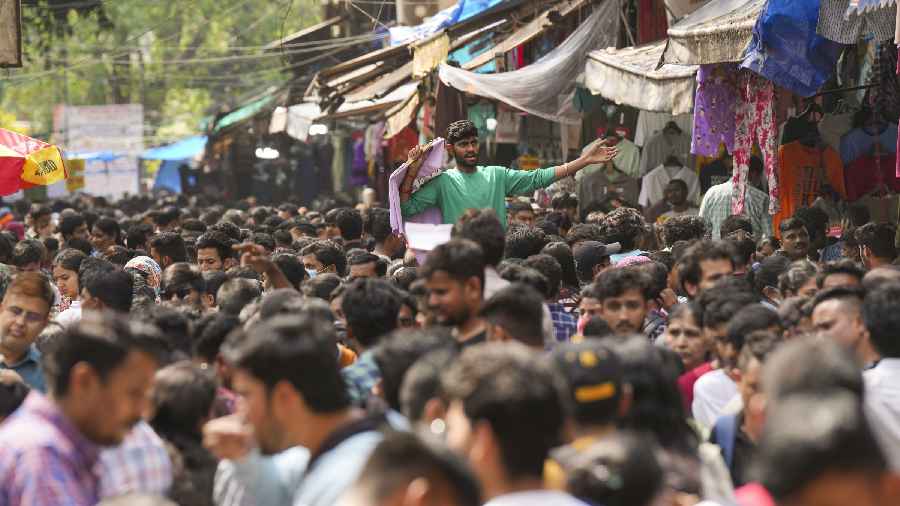The rise in Covid cases is indicative of the SARS-CoV-2 virus moving into an endemic state in India and behaving like other coronaviruses that cause common cold-like symptoms and can keep reinfecting, say scientists.
Giving the reassurance that a monster spike on the lines of the Delta wave in the spring of 2021 is unlikely due to the endemic nature of the virus, they also cautioned that the spread could be halted by following established protocols.
“COVID-19 is effectively endemic in the country, and virtually all of us will have sustained an infection by now, whether we knew it or not. The virus is behaving like coronaviruses that cause common-cold-like symptoms and can keep reinfecting us,” said Gautam I. Menon, dean (research) and professor, Departments of Physics and Biology at Haryana’s Ashoka University.
Immunologist Satyajit Rath added that the actual magnitude of the infection is unknown.
Questioning the reliability of reported Covid case numbers, he told PTI, "We are likely to keep seeing ups and downs of Covid cases, at different times in different places, for a long time to come." According to the Union Health Ministry on Friday, India recorded 6,050 fresh coronavirus cases, the highest in 203 days, with 28,303 active cases. The death toll has increased to 5,30,943 (over 5.3 lakh) with 14 new fatalities while the daily positivity rate has been recorded at 3.39 per cent.
The surge is being attributed to a new COVID-19 subvariant, XBB.1.16, which has been circulating through India for the last few months.
"At the present time, there are only about 800 sequences of XBB.1.16 from 22 countries. Most of the sequences are from India and in India XBB.1.16 has replaced the other variants that are in circulation. So, this is one to watch. It has been in circulation for a few months," the World Health Organisation said in a recent statement.
According to the WHO, XBB.1.16 is very similar in profile to the earlier XBB.1.5 variant. It has one additional mutation in the spike protein which in lab studies shows increased infectivity, as well as potential increased pathogenicity. The virus uses the spike protein to infect and enter human cells.
In Menon’s view, the numbers will continue to rise in the coming weeks, particularly in Kerala and Maharashtra where surveillance systems are stronger. But they will not reach the levels seen during the Delta wave.
"From current indications, the fraction of severe cases also appears to be far smaller than for Delta," Menon told PTI.
"These number surges will be the outcome of emerging virus variants, loss of vaccine- or infection-acquired protective immunity in people, and environmental factors,” Rath, professor emeritus at Indian Institute of Science Education and Research, Pune, added.
Viswesvaran Balasubramanian, consultant, interventional pulmonology and sleep medicine, at Hyderabad’s Yashoda Hospitals said there are active Covid cases in the hospital but the numbers are minimal.
"Most of the infections are mild and are treated on an outpatient basis," he told PTI.
He said the need for hospital admissions in view of severe Covid infection is seen among the elderly and those with immunocompromised conditions.
"Currently, COVID-19 infections are mild, with predominantly upper respiratory tract symptoms like sore throat, running nose, fever, and body aches. In patients requiring admission, cough, breathlessness, and fall in oxygen saturation are seen in most," the doctor explained.
Menon noted that the relatively small number of people dying of Covid as of now seem to be those with pre-existing conditions or those who are elderly or immune-compromised in some way. He also observed that people are likely not being tested in sufficient numbers, as was the case during the Omicron wave.
“As long as we keep careful track of mortality and severe cases, we should be able to track the disease well, even in the absence of large-scale testing,” he argued.
"Research suggests that a substantial part of the immunity we have built up both from prior infections and vaccinations will prevent severe COVID-19 disease, although it will not prevent infection with new variants," Menon said.
Assuaging fears, the scientist explained that as the virus mutates, there may be further waves of infection but they are unlikely to have the devastating impact of the Delta variant due to the virus' endemic character.
"Policy makers should remind those who are vulnerable that they would do best to avoid infection. It should also remind those who experience symptoms to stay home, isolate, and mask up to prevent further spread," he said.
Rath agreed, saying the disease is killing people in the same vulnerable group that it was earlier. However, fewer people are dying since many have at least some immunity with either vaccination or prior infection.
"The policy prescriptions remain the same; build an adequate, decentralised public health surveillance and care delivery system, do much better about both vaccination policy and implementation, and plan and provide for long Covid," he said.
Coronaviruses are a large group of viruses that cause diseases in animals and humans. They often circulate among camels, cats, and bats, and can sometimes evolve and infect people. The COVID-19 virus is one of the types of coronavirus.
According to the Health Ministry's website, 220.66 crore doses of Covid vaccine have been administered so far in India.
Except for the headline, this story has not been edited by The Telegraph Online staff and has been published from a syndicated feed.










